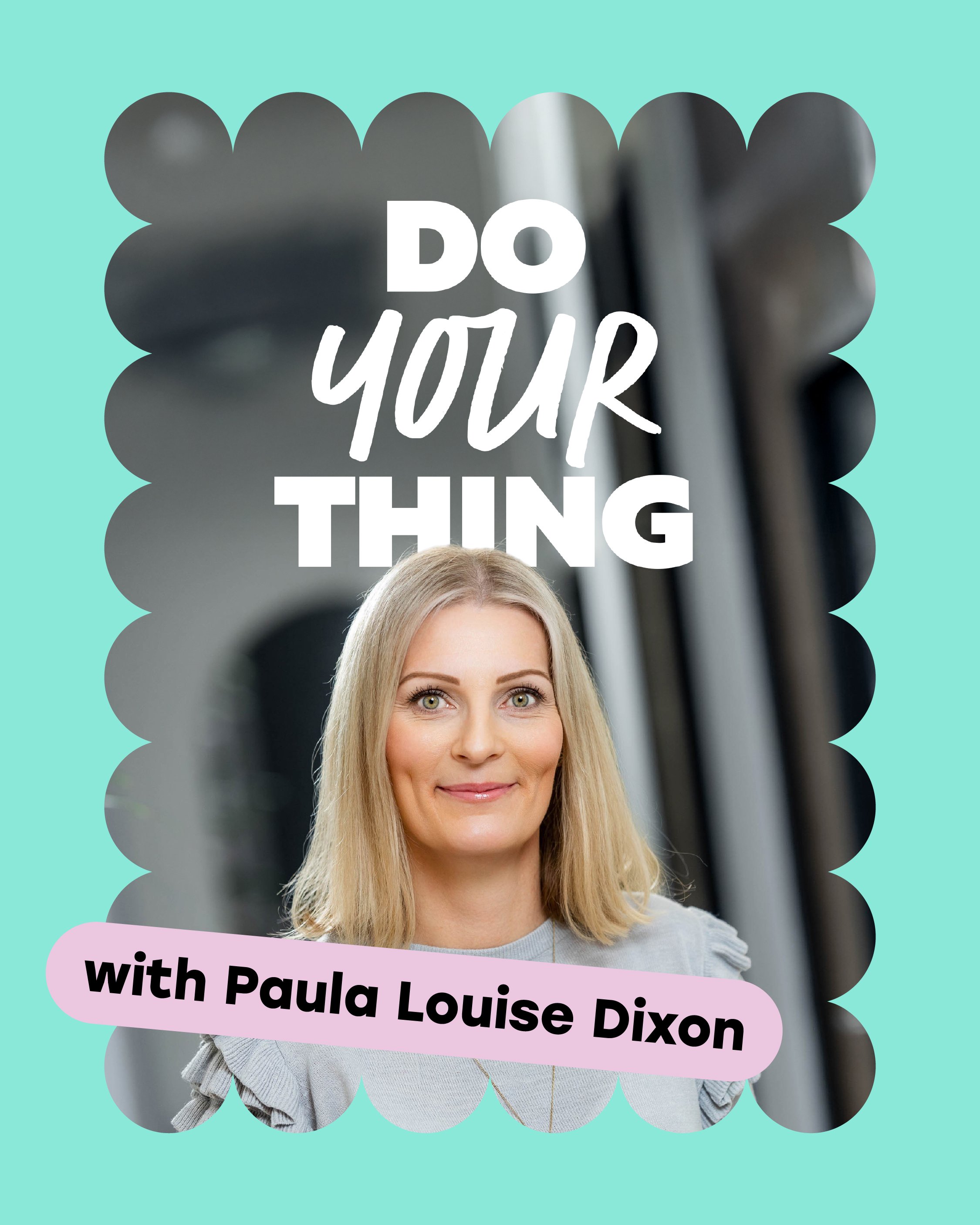“There’s power in understanding yourself in business” with Paula Dixon
Making choices that are right for you
“Stress isn’t always a bad thing.
A stressor can actually improve performance, but beyond a certain point, you fall off a cliff and head towards burnout.”
Paula is a coaching and business psychologist and founder of Hazon Consulting, where she helps individuals, teams and organisations optimise their potential through psychology-informed coaching and development. Her work focuses on helping people understand themselves better, align with their values and build healthier, more fulfilling careers and businesses.
When you run your own business, it’s easy to get caught up in doing mode: pushing through, adapting, achieving, and constantly asking ‘what’s next?’ But what if the real key to sustainable success isn’t doing more, but understanding yourself better?
In the first episode of my podcast, Do your thing, I chatted with Paula Louise Dixon, coaching and business psychologist, founder of Hazon Consulting, and all-round brilliant human who helps leaders and founders understand how they work best.
We got into everything from values and self-awareness, to stress, alignment, and what it really takes to build a business that supports you, not drains you.
Living and leading by your values
Paula describes herself as a “people optimiser”, using psychology to help individuals and organisations unlock their potential. A huge part of that, she says, comes down to understanding your values.
Our values are held in the emotional part of the brain, below the level of language. That’s why when someone asks you to do something that goes against your values, you have a really strong emotional reaction to it. We don’t always know what our values are but we can feel them. Paula helps her clients put words to those instincts so they can make decisions that align with who they are, not just what they think they should do.
“One of my favourite metaphors is the stick of rock – where the letters run all the way through. That’s what values are like. They sit deep in the emotional brain, below language.”
Helping people put language to those feelings means they can make choices as leaders and founders that keep them motivated and in alignment.
The link between stress and performance
Paula shared the “stress curve” with me years ago, and it’s something I still come back to now.
We all operate differently under pressure. Some of us thrive on a bit of stress, others need a calmer pace - but understanding where your personal limits sit is vital. Stress isn’t always a bad thing. A stressor is something that can actually improve performance, but beyond a certain point, you fall off a cliff and head towards burnout.
“Some people thrive under pressure, but it’s not sustainable. You have to understand your own tipping point.”
Founders, especially, tend to live near the top of that curve, driven by motivation, independence, and high standards. But those same traits can also push us too far if we’re not careful.
Understanding your own rhythm
“We can’t always be in an eternal spring. Sometimes we need to reflect and recharge, whether it’s over a week or a season.”
What I love about Paula’s approach is that she’s realistic. She doesn’t talk about balance like it’s a fixed state . It’s about rhythm and awareness. There’s real power in understanding your own patterns: when you need energy, when you need quiet, when you’re at your best. As Paula says:
“There’s power in understanding yourself. If you can spot when something’s changed - how you normally feel versus how you’re feeling now - you can stop burnout before it happens.”
Leadership through self-awareness
So much of Paula’s work with founders and leaders focuses on identity. Understanding who you are, not just what you do. When you know your values, you can show up more authentically. You make decisions that feel right, set better boundaries, and lead in a way that’s true to you.
That’s what makes self-awareness such a powerful leadership skill. It’s not fluffy; it’s practical. It’s how you build a sustainable business without losing sight of yourself.
The importance of community
As founders, those same traits that drive us (motivation, independence, high standards) can also push us too far. That’s why it’s so important to have people around you who’ll notice when you’re not okay. Running a business can be lonely and Paula reminded me how much having a strong network matters.
“Having that community around you, people you can be honest with, who’ll champion you and say ‘we’ve got you’, is so important when you’re a founder.”
Even coaches and psychologists need people who see them as human. Paula herself reflected that she’s “a coach and a founder, so people expect you to have your stuff together. But there are always moments when you’re worried or things are hard. Having people who believe in you makes all the difference.”
Bringing your values into your brand
When Paula talked about how her own brand came together, I couldn’t help but smile because it shows exactly how understanding yourself filters through everything you create.
Paula’s brand is built around adventure, curiosity and achievement. Traits that reflect who she is as a person and how she works with her clients. Together, we talked about how important it is to make your brand values feel real rather than corporate or generic.
“So many organisations say things like ‘integrity’ or ‘quality’ but that doesn’t mean anything on its own. It’s about finding the language that’s uniquely reflective of you.”
We both agreed that’s where a strong brand strategy starts: by grounding your business in what genuinely matters to you. When you know your own values, your brand feels more natural, more consistent, and more you.
Defining her brand was one of those lightbulb moments for Paula. She’s someone who wears a lot of hats: coaching psychologist, consultant, leader, founder, collaborator. For a long time, she found it tricky to bring all those strands together in a way that made sense to other people.
“I do lots of different things: change, recruitment, leadership development, executive coaching, neurodiversity - and it’s hard to fit that under one umbrella. But when I got to ‘optimising people potential’, everything finally made sense.”
That phrase became the thread that ties all her work together, and it’s such a powerful reminder for any founder or freelancer who feels scattered by all the things they do.
When you zoom out and look at the bigger picture, there’s usually a unifying theme, a through-line that connects it all. Paula’s story is proof that when you understand your values and your purpose, your brand strategy and message naturally becomes clearer.
Building a business that fits you
What I love most about Paula’s perspective is that it’s not about fixing yourself. It’s about understanding yourself.
When you know what motivates you, what drains you, and what you value, you can design a business that works with you, not against you. That’s when the work starts to feel sustainable, and when you can really thrive.
You can find Paula, Hazon Consulting, and ThinkND. Connect with her on LinkedIn.
And if you enjoyed this chat, you can listen to the full episode of Do your thing, and subscribe, wherever you get your podcasts.


